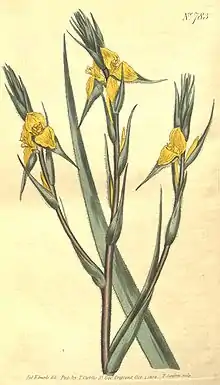| Philydraceae | |
|---|---|
 | |
| Philydrum lanuginosum[1] | |
| Scientific classification | |
| Kingdom: | Plantae |
| Clade: | Tracheophytes |
| Clade: | Angiosperms |
| Clade: | Monocots |
| Clade: | Commelinids |
| Order: | Commelinales |
| Family: | Philydraceae Link[2] |
| Genera | |
| |
Philydraceae is a family of flowering plants composed of three genera and a total of six known species.[3] Such a family has not been recognized by many taxonomists.
The APG II system, of 2003 (unchanged from the APG system, of 1998), does recognize such a family and places it in the order Commelinales, in the clade commelinids, in the monocots. It consists of only very few species of perennial, tropical plants in Southeast Asia and Australia.
References
- ↑ 1804 illustration by John Sims (1749-1831) - Curtis's botanical magazine vol. 19-20 tab. 783 (http://www.botanicus.org/page/471196)
- ↑ Angiosperm Phylogeny Group (2009). "An update of the Angiosperm Phylogeny Group classification for the orders and families of flowering plants: APG III". Botanical Journal of the Linnean Society. 161 (2): 105–121. doi:10.1111/j.1095-8339.2009.00996.x. Archived from the original (PDF) on 2017-05-25. Retrieved 2013-06-26.
- ↑ Christenhusz, M. J. M. & Byng, J. W. (2016). "The number of known plants species in the world and its annual increase". Phytotaxa. Magnolia Press. 261 (3): 201–217. doi:10.11646/phytotaxa.261.3.1.
External links
 Media related to Philydraceae at Wikimedia Commons
Media related to Philydraceae at Wikimedia Commons- NCBI Taxonomy Browser
- links at CSDL
- Philydrella drummondii in Western Australia
- Philydrella pygmaea in Western Australia
- Philydrum lanuginosum in Western Australia
This article is issued from Wikipedia. The text is licensed under Creative Commons - Attribution - Sharealike. Additional terms may apply for the media files.
